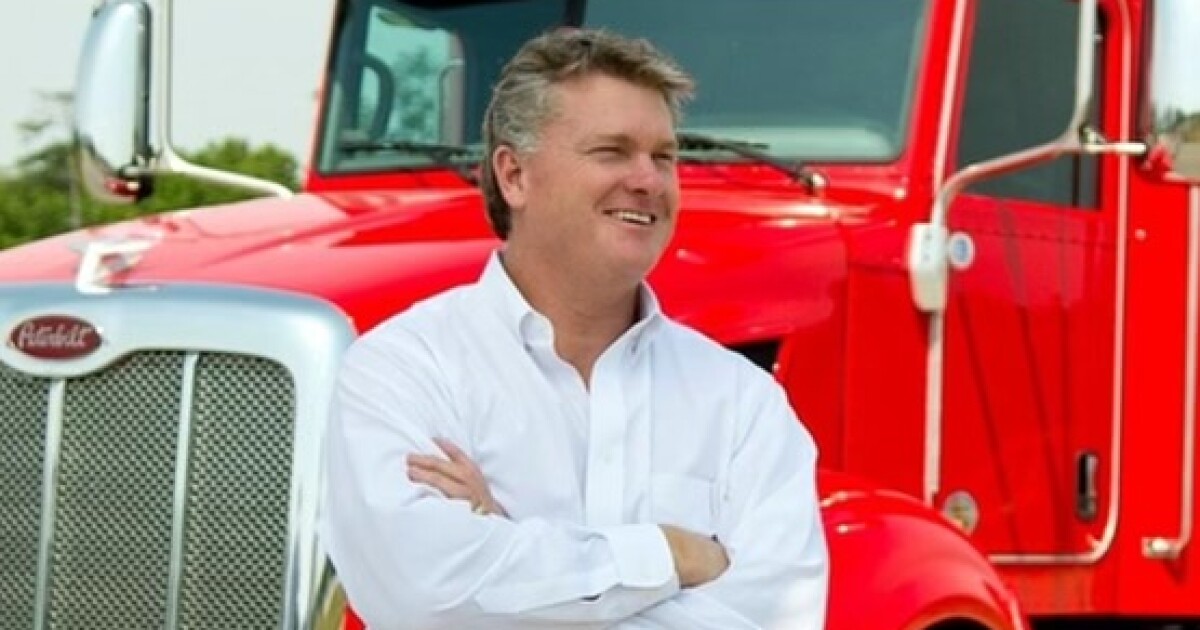

Mike Collins is riding a Big Red Wave to Congress. Literally.
The Republican nominee in Georgia’s 10th Congressional District, the owner of a regional trucking company, has already logged 1,200 miles on the campaign trail this election cycle in a red 2006, extended-hood 379 Peterbilt big rig. Collins nicknamed his truck, with its 500 horsepower, 18-speed transmission Caterpillar engine, the “Big Red Wave” and drove it all over Georgia’s 10th District, stopping in all 18 counties covered by the vast rural seat that runs from due east from the outskirts of Atlanta.
Along the way, Collins became the latest in a string of Georgia Republicans to flatten primary competition endorsed by former President Donald Trump, defeating Vernon Jones in a Tuesday runoff, 75% to 25%. He should cruise to victory in November in a district drawn to elect Republicans even in election cycles not shaping up as a GOP wave, as is this one, as President Joe Biden reels from skyrocketing inflation and broad dissatisfaction with Democratic leadership in Washington.
Jones, 61, sought the Republican nomination in the 10th District after abandoning his gubernatorial bid at Trump’s behest. The former Democrat, who is black, was previously a member of the Georgia House of Representatives and emerged as a prominent Trump ally during the former president’s White House term. So, how did Collins beat Jones? The Republican, who is on track to succeed departing Rep. Jody Hice (R-GA), chalked it up to authenticity and “trust.”
“We had been in this race a lot longer than our Trump-endorsed opponent,” Collins, 55, told the Washington Examiner in an interview.
“I’ve spent 30 years in private industry, really creating jobs,” he added, saying of Jones: “He’s spent 30 years as a radical — corrupt, radical left-wing Democrat. People see through that. “
Collins also invoked his late father, former Rep. Mac Collins of Georgia, a Republican in office from 1993 to 2005. “My dad taught me from a very early age: It doesn’t matter if it’s personal, business or [public service] — people need to trust you, and they’ve got to like you. … That’s what it boiled down to,” he said.
SUPREME COURT OVERTURNS ROE V. WADE, PAVING WAY FOR STATE ABORTION BANS
To the extent Collins had an advantage over Jones on trust and likability, it could be because he had run for Congress eight years ago, losing in the primary to Hice, and remained active in GOP politics in the district. His firm, Collins Trucking, also is a fixture in the area. But Collins said there was more to it than that. Supervising a firm that runs “just north of 100 trucks,” 95 of which are company-owned, gave him a front-row seat to the issues foremost on voters’ minds: inflation, logistics and supply-chain deficiencies, and inflation that has caused record-high gas prices.
“Of the 435 people in [the House], there is not a single person who’s in the business of trucking like we are,” Collins said. “That alone gives me a qualification to go to Washington and represent the average blue-collar worker. … It was a good one-two punch.”
Collins, undaunted by being just a freshman backbencher with just one floor vote to wield, is convinced he can accomplish much to address critical topics: the economy, illegal immigration, and the rise of a belligerent China, to name just a few. In part, that’s because he envisions being part of a large and energetic Republican majority, driven by new members like himself, who are committed to delivering for their voters back home.
Collins said the excessive federal spending has to stop. Related: He wants Congress to stop relying on bloated omnibus spending bills and continuing resolutions and actually approve the individual appropriations bills intended to fund various sectors of the federal government. Collins wants to use tariffs more aggressively to rein in China and pass legislation to secure the Mexican border.
Of course, there is just one problem with Collins’s plans. Well, there are two problems.
First is President Joe Biden, who is not about to sign far-reaching conservative legislation. Second is the Senate. No legislation gets through the Senate without 60 votes, and Democrats in the chamber are highly unlikely to lend their support to the kind of legislation Collins would like to see passed through the House. Even if Republicans capture the Senate majority, their prospects for winning a filibuster-proof majority are slim to none.
Despite these obstacles, Collins is optimistic.
“We can force [Biden’s] hand on a lot of stuff,” he said. “You can go all the way back to [President] Bill Clinton — and look what they did with welfare reform. [Congressional] Republicans had to send it to him three times, but finally, he understood that the American people want this. I don’t care who it is in the White House. They are going to listen.”
CLICK HERE TO READ MORE FROM THE WASHINGTON EXAMINER
The key, Collins said, is having a speaker of the House who sets goals, identifies plans for achieving those goals, and holds people accountable for doing their part. House Minority Leader Kevin McCarthy (R-CA) is in line to be elected speaker should Republicans win the chamber in November.
“We’re not up there for a social life,” Collins said. “I’m going up there to fix this problem, and then I’m coming back to Georgia. This ain’t rocket science.”






